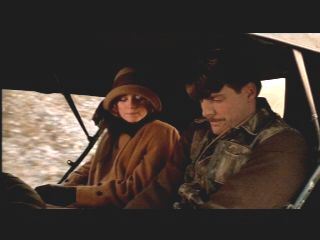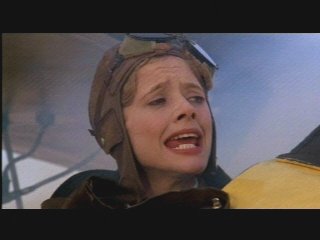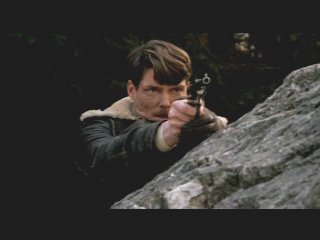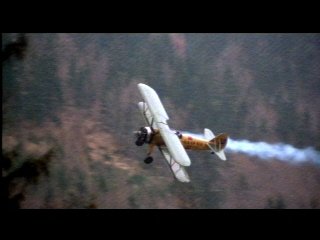
|
|
|
|
|
|
|
|
|
|
|
|
|
(1985) Director: George
Miller
There will no doubt be a number of people, upon seeing The
Aviator, who will have the opinion that it was made in a very
simplistic way. Well, perhaps it was inevitable that it ended up that
way, because what happens in the movie - its core and the surrounding
material - is anything but simplistic. In fact, the movie does seem to be making some kind of attempt to capture that Somewhere In Time fan base, not just with Reeve being cast in the leading role, but also (and not limited to) with where and when the events are taking place - again, in the early part of the century in the American countryside. The pre-credits sequence takes place in Texas in 1918, where Edgar Anscombe (Reeve) is a flight instructor for the still-new U.S. Air Force, and at that moment is instructing a new recruit who is having trouble in landing an airplane on his own. Based on that scene, and the fact that it's being played right before the opening credits, most viewers will immediately guess that when the student makes his next attempt at landing, something terrible will happen as a result, something so terrible that it will haunt Edgar through and beyond the opening credits. As a matter of fact, that's what happens - the student panics during the landing attempt and is killed when the airplane crashes, and the injured Edgar immediately gets a haunted look on his face. Though Edgar is clearly affected badly by this incident, it's hard to understand his way of thinking after witnessing the ridiculous sights of the student being unintentionally funny during his freaking out, as well as the airplane-crashing shot obviously being accomplished by having the airplane suspended by some kind of crane, and positioned at an impossible angle. It doesn't help that seconds after Edgar crawls away from the wreck of the rickety wooden airplane, it explodes as if it had been hit with napalm. However it may look to us, the incident still leaves
Edgar with mental and physical scars, even when the movie then jumps
ten years ahead. It is perhaps inevitable that this mentally affected
man who was involved in the death of someone has found work at the post
office. Based in Elko, Nevada, Edgar works for the still-new air mail
delivery system in the territory. Though surrounded by friends and
kindly boss Moravia (Jack Warden), he is so withdrawn that he not only
refuses the Thanksgiving dinner invitation given to him by Very familiar stuff, you must agree. And it's not done any better than that stuff that happened before it. If a filmmaker dares to resurrect an old weepie like this nowadays, he needs to work even harder than his counterparts in the past to pull it off, especially when it comes to constructing the characters as well as casting appropriate actors to play them. In the cast of The Aviator, neither of these important attributes - pardon the expression - manages to fly. To begin with, Christopher Reeve is completely wrong for this movie. Though I'd never say that Reeve lacked any acting talent - he sure made a fine Superman - at the same time I feel that his range was limited. Though he manages to distance himself from his most famous role here - I actually never once thought of Superman during the movie - he just doesn't have the range to express the emotions this particular character of his has to express. His acting out the reluctance of his character to engage in personal conversations is extremely overdone, with him mumbling almost inaudibly and refusing to make eye contact, instead casting his eyes to the ground, and other such actions that more suggest a form of autism rather than a withdrawn personality. When it comes to expressing emotions of a more firmer nature, he always sounds stilted, sometimes laughably so, from exclaiming "Come on baby, climb for me!" or provoked into screaming at Tillie after being pushed by her for so long. Still, as bad as he might be in this particular role,
Reeve never gets under your nerves with his performance, and he comes
across even better with his being paired with Arquette than if he was
alone. Arquette doesn't just give a terrible performance, but it goes
far beyond giving a merely inept performance. She gives her character a
personality that does not suggest that of a teenager of that era (even
one that happened to be spoiled) raised in an upper class society, but
happens to have a resemblance to a society that happened to exist when
the movie was being made - the Valley Girl society. In addition All kidding aside, it obviously fails to give her character the necessary depth it needs, and her character ends up being as vague and murky as Reeve's. In fact, with such mismanagement from the actors as well as the script, it's a miracle that there manages to be one fine moment. That actually goes to Warden, during a sequence when an upset Mr. Hansen makes clear that he thinks Moravia employs pilots who are incompetent in searching for downed people, let alone general flying. Warden's Moravia character responds in a quiet but long monologue, revealing the personal histories of the pilots, that reveals that these crippled and scarred people are in fact the bravest and most dedicated people you'll find anywhere. Not only is it an atypically superb piece of writing in the middle of this dreariness, Warden delivers it without a single flaw; this would be a good scene for aspiring actors to study. While I'm at it, I might as well take this opportunity to describe what little else positive can be found in The Aviator. The cinematography is outstanding; instead of it being labored and calculated with countless shots of fields of yellow grass bathed by a golden sun, most scenes are in fact shot in overcast conditions, yet still looking clear and bright enough to see all the details. You can almost sense the cold the characters are feeling on top of these mountains. Though I was convinced that the movie had been filmed in or near the mountains in the Nevada wilderness, I was surprised to find out in the closing credits that the movie had actually been shot in Yugoslavia; wherever it might have been, it sure looks good as well as authentic. Aside from making the backdrop look nice at times,
director George Miller (who's gone from works like The Man From
Snowy River to making movies like Cybermutt in
recent years) never seems able to present just about any moment in the
movie in a way that feels right. For example, Edgar and Tillie's first
conversation (and first of many verbal clashes) is filmed with the
actors almost
Check for availability on Amazon (VHS) See also: Cheyenne Warrior, A Savage Hunger, White Wolves |
 Not only is there
precious little here that you haven't seen before, there is precious
little effort it give it any kind of new look or spin. There is so much
that is familiar here you have to wonder why the producers went to the
trouble to buy the movie rights to the Ernest K. Gann novel of the same
name. And to top things off, it's not that often that any of this
extremely familiar material is recreated in any way that could be
considered reasonably professional. Faced with a product both
exceedingly familiar and not well done at even doing that, it's perhaps
not a surprise that MGM/UA ultimately ended up choosing to do very
little with it on its theatrical release, and why in subsequent years
the movie hasn't built up a strong and loyal audience like Reeve's Somewhere
In Time despite at times seemingly aimed at that very same
crowd.
Not only is there
precious little here that you haven't seen before, there is precious
little effort it give it any kind of new look or spin. There is so much
that is familiar here you have to wonder why the producers went to the
trouble to buy the movie rights to the Ernest K. Gann novel of the same
name. And to top things off, it's not that often that any of this
extremely familiar material is recreated in any way that could be
considered reasonably professional. Faced with a product both
exceedingly familiar and not well done at even doing that, it's perhaps
not a surprise that MGM/UA ultimately ended up choosing to do very
little with it on its theatrical release, and why in subsequent years
the movie hasn't built up a strong and loyal audience like Reeve's Somewhere
In Time despite at times seemingly aimed at that very same
crowd. his best friend's
sister, but that death of that 18 year-old boy has apparently affected
him so much that he has sworn never to get married (make of that what
you will.) One day, though, he finds himself having to deliver more
than sacks of mail - Bruno Hansen (Sam Wanamaker), the millionaire
owner of the air base and airplanes, asks Moravia that the next flight
out also carry his 16 year-old daughter Tillie (Arquette). The obvious
question of why he just doesn't put her on a train - which is even
brought up in the movie at one point - is not answered for the longest
time, and once it is, it proves to be so dumb and illogical that it is
in no way a satisfactory answer. You might not guess the reason before
it's revealed, but you'll certainly guess that Tillie ends up in
Edgar's airplane... that this mismatched duo doesn't exactly get along
right from the beginning... that during the journey the airplane
crashes deep in the wilderness... that they still bicker for a while
after the crash... that they soon find they must work together to
survive... and that not only do I not have to bother to write any more
of what happens, I didn't even have to write out all those plot turns
in the first place.
his best friend's
sister, but that death of that 18 year-old boy has apparently affected
him so much that he has sworn never to get married (make of that what
you will.) One day, though, he finds himself having to deliver more
than sacks of mail - Bruno Hansen (Sam Wanamaker), the millionaire
owner of the air base and airplanes, asks Moravia that the next flight
out also carry his 16 year-old daughter Tillie (Arquette). The obvious
question of why he just doesn't put her on a train - which is even
brought up in the movie at one point - is not answered for the longest
time, and once it is, it proves to be so dumb and illogical that it is
in no way a satisfactory answer. You might not guess the reason before
it's revealed, but you'll certainly guess that Tillie ends up in
Edgar's airplane... that this mismatched duo doesn't exactly get along
right from the beginning... that during the journey the airplane
crashes deep in the wilderness... that they still bicker for a while
after the crash... that they soon find they must work together to
survive... and that not only do I not have to bother to write any more
of what happens, I didn't even have to write out all those plot turns
in the first place. to acting and
speaking in an anachronistic manner, her delivery has the same effect
as fingernails on a blackboard, made worse by the fact her character
spends about three-quarters of the movie actively complaining about one
thing or another. Actually, even a better actress wouldn't have managed
to make much of a difference, since the screenplay seems content to
portray Tillie as a spoiled teenager with no direction in life and with
almost no background. There is one ridiculous attempt to flesh her out,
and that happens to be when she first appears in the movie. We see her
wearing masculine clothing as she is strutting around in her room while
smoking a cigarette, stopping in front of her mirror to say, "I'm
speaking to you, young lady! You're going to go through this with your
chin held high!" Perhaps that was, in fact, a candid shot of Arquette
motivating herself on the first day of shooting.
to acting and
speaking in an anachronistic manner, her delivery has the same effect
as fingernails on a blackboard, made worse by the fact her character
spends about three-quarters of the movie actively complaining about one
thing or another. Actually, even a better actress wouldn't have managed
to make much of a difference, since the screenplay seems content to
portray Tillie as a spoiled teenager with no direction in life and with
almost no background. There is one ridiculous attempt to flesh her out,
and that happens to be when she first appears in the movie. We see her
wearing masculine clothing as she is strutting around in her room while
smoking a cigarette, stopping in front of her mirror to say, "I'm
speaking to you, young lady! You're going to go through this with your
chin held high!" Perhaps that was, in fact, a candid shot of Arquette
motivating herself on the first day of shooting.  in the background,
when such a key moment needs to be seen up close so we are better to
sense how the characters are feeling. Miller's backing away from
showing any kind of emotion and atmosphere is in no way confined to
just this moment. There's never any sense of danger, no sense of
urgency, either back in civilization where Moravia is organizing the
search, or with Edgar and Tillie. Even the part of the movie where
their plane crashes is done in a shockingly lackluster manner. And
their subsequent struggle for survival and their fear of dying out
there has the same impact as watching two bored teenagers sitting
around in your neighborhood park. They each say at various points they
will die, but even they don't come across as believing their own words.
In desperation, Miller throws in some fierce wolves - yes, the hoary
old man-eating wolf pack crisis is resurrected here despite the fact
it's well known your average wolf would rather run from a human than
even get close to one. The worst thing, however, is that ultimately in
the end, this movie turns out to be
about nothing. Nothing really changes for anyone, and there seems to be
no real point - unless it's trying to teach us that spending several
days cold and hungry in the wilderness will make the prospect of a free
Thanksgiving dinner more enticing. Perhaps that's an appropriate
message, since The Aviator is a real turkey.
in the background,
when such a key moment needs to be seen up close so we are better to
sense how the characters are feeling. Miller's backing away from
showing any kind of emotion and atmosphere is in no way confined to
just this moment. There's never any sense of danger, no sense of
urgency, either back in civilization where Moravia is organizing the
search, or with Edgar and Tillie. Even the part of the movie where
their plane crashes is done in a shockingly lackluster manner. And
their subsequent struggle for survival and their fear of dying out
there has the same impact as watching two bored teenagers sitting
around in your neighborhood park. They each say at various points they
will die, but even they don't come across as believing their own words.
In desperation, Miller throws in some fierce wolves - yes, the hoary
old man-eating wolf pack crisis is resurrected here despite the fact
it's well known your average wolf would rather run from a human than
even get close to one. The worst thing, however, is that ultimately in
the end, this movie turns out to be
about nothing. Nothing really changes for anyone, and there seems to be
no real point - unless it's trying to teach us that spending several
days cold and hungry in the wilderness will make the prospect of a free
Thanksgiving dinner more enticing. Perhaps that's an appropriate
message, since The Aviator is a real turkey.